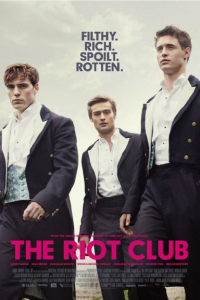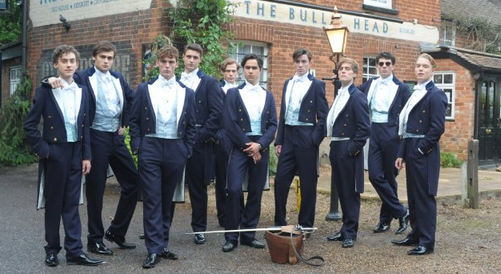
 Director Lone Scherfig’s “The Riot Club” is a difficult take on the bad behavior of a group of privileged Oxford University students. It is a film that is bound to draw comparisons to Mary Harron’s 2000 adaptation of Bret Easton Ellis’ “American Psycho.” While “The Riot Club” is a bit more grounded and less fantastical, both films feature dangerous rich young men who seem to lack a moral rudder. And like Harron’s film, it seems that it takes a women director, like Scherfig (who also directed the Oscar nominated “An Education”) to expose the nasty side of the arrogant wealthy male.
Director Lone Scherfig’s “The Riot Club” is a difficult take on the bad behavior of a group of privileged Oxford University students. It is a film that is bound to draw comparisons to Mary Harron’s 2000 adaptation of Bret Easton Ellis’ “American Psycho.” While “The Riot Club” is a bit more grounded and less fantastical, both films feature dangerous rich young men who seem to lack a moral rudder. And like Harron’s film, it seems that it takes a women director, like Scherfig (who also directed the Oscar nominated “An Education”) to expose the nasty side of the arrogant wealthy male.
In “The Riot Club,” we meet Alistair Ryle (“The Hunger Games’” Sam Claflin) as he checks into Oxford University. His parents are angry that he does not want to take his older brother’s grand dorm room. But a fellow classmate, Miles Richards (Max Irons) switches with him much to Alistair’s disgust. He just doesn’t want to be like his perfect brother. In time, Alistair and Miles will become members of a very exclusive club—the Riot Club. And their lives will never be the same.
The Riot Club, we learn in an amusing opening sequence, has its roots in Oxford’s past and requires the members to eat, drink, and be merry to excess. Encouraging extreme behavior is particularly dangerous when one of the new members may be a psychopath with a particular agenda. The film is essentially one big party gone horribly wrong. And the events are tough to watch with lots of vulgarity.
“The Riot Club” will divide viewers—some will find it in bad taste. But there is a twisted moral on display. If you are rich, and you do irresponsible things, you will eventually pay a high price. But there are shades of grey that money and privilege can provide, even if the wrongness is without question. And that conflict leaves the viewer cold.

